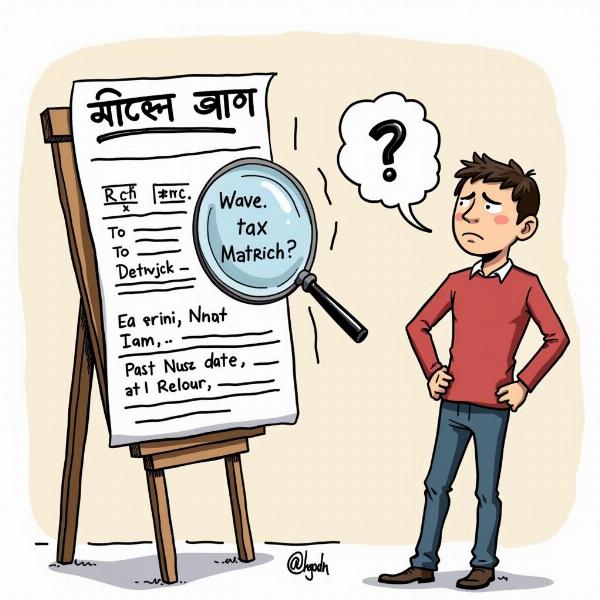Understanding the concept of “retrospective effect” is crucial in various legal and administrative contexts. This article aims to delve into the meaning of “retrospective effect” in Hindi, exploring its nuances and providing practical examples to solidify your understanding. Knowing the Hindi equivalent of this term can be invaluable for navigating legal documents, contracts, and governmental pronouncements.
What Does “Retrospective Effect” Mean?
“Retrospective effect,” also known as “ex post facto” application, refers to a law or decision that applies to events or actions that occurred before it was enacted or made. Imagine a new tax law being introduced today that applies to income earned last year. This is a classic example of retrospective effect. In Hindi, “retrospective effect” can be translated as पूर्वप्रभावी (purvaprabhavi) or पिछली तारीख से लागू (pichhli tarikh se lagu). While both convey the idea of applying to the past, पूर्वप्रभावी (purvaprabhavi) is generally preferred in formal contexts due to its concise and precise nature.
Understanding पूर्वप्रभावी (Purvaprabhavi) in Different Contexts
The application of retrospective effect can vary across different fields. In legal settings, it can pertain to amendments to existing laws, new judicial interpretations, or administrative rulings. Understanding how पूर्वप्रभावी (purvaprabhavi) operates in these contexts is essential.
Legal Implications of Retrospective Effect
In the legal realm, retrospective effect can have significant implications. For instance, if a law is amended retrospectively, it can impact past transactions, contracts, and even criminal convictions. This can create uncertainty and potentially unfair outcomes if not carefully implemented.
Administrative Use of Retrospective Effect
Government agencies may also apply decisions with retrospective effect. This could involve revising past tax assessments, altering eligibility criteria for benefits, or modifying regulations related to business operations. It’s vital to stay informed about any administrative pronouncements that might have a पूर्वप्रभावी (purvaprabhavi) impact on your situation.
 Retrospective Taxation in India
Retrospective Taxation in India
Examples of Retrospective Effect
Here are some examples to clarify the meaning of retrospective effect (पूर्वप्रभावी – purvaprabhavi):
- Tax Laws: A new tax levied on profits earned in the previous financial year.
- Criminal Law: A new law increasing the punishment for a crime committed before the law’s enactment.
- Contract Law: A court decision reinterpreting a clause in a contract that affects past contractual obligations.
Why is Understanding Retrospective Effect Important?
Understanding retrospective effect is crucial for businesses, individuals, and legal professionals alike. It allows them to anticipate potential impacts of new laws and regulations, plan accordingly, and protect their interests. Knowing the Hindi term पूर्वप्रभावी (purvaprabhavi) ensures effective communication and comprehension in legal and administrative matters.
Conclusion
“Retrospective effect,” or पूर्वप्रभावी (purvaprabhavi) in Hindi, is a complex legal concept with significant implications. By understanding its meaning and applications, you can better navigate the legal and administrative landscape. Keeping yourself informed about any laws or decisions with retrospective effect is crucial for protecting your rights and interests.
FAQ
- What is the most common Hindi translation for “retrospective effect”? पूर्वप्रभावी (purvaprabhavi) is the most commonly used and preferred term.
- Can retrospective effect be applied in criminal cases? Yes, but it is often subject to limitations and constitutional challenges.
- How can I stay updated on laws with retrospective effect? Following legal news and consulting with legal professionals are recommended.
- Is retrospective effect always negative? No, it can sometimes be used to correct past injustices or clarify ambiguities.
- What is the difference between “retrospective” and “prospective”? Retrospective refers to the past, while prospective refers to the future. prospective effect meaning in hindi
- Are there any legal challenges to retrospective application? Yes, retrospective application can be challenged on grounds of fairness and due process. meaning of retrospective in hindi
- Can retrospective legislation be applied to contracts? Yes, but it depends on the specific legislation and the terms of the contract. in hindsight meaning in hindi
Meaning-Hindi.in is your trusted partner for accurate and culturally sensitive Hindi translation services. We specialize in legal, business, technical, and educational document translation, ensuring your message is conveyed effectively. Whether you need on the cards meaning in hindi or antedated meaning in hindi translated, our team of expert linguists is here to help. Contact us today at [email protected] or call us at +91 11-4502-7584. Meaning-Hindi.in is your one-stop solution for all your Hindi translation needs.